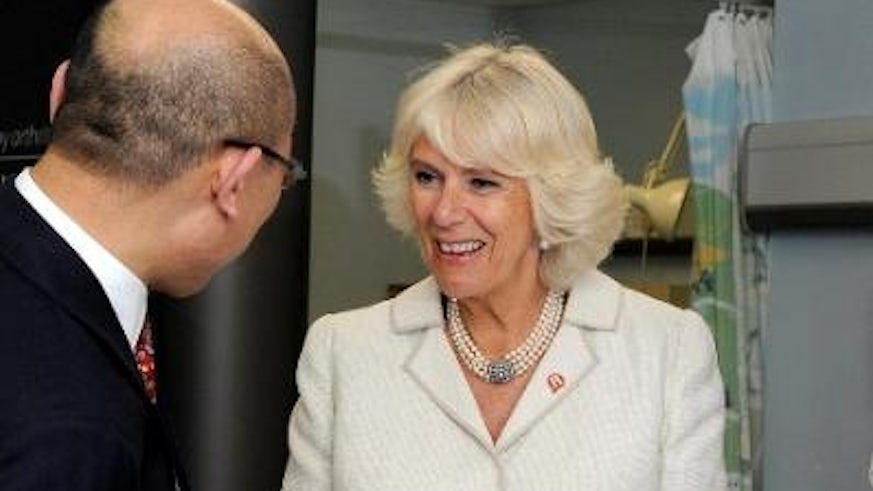Royal Visit
1 July 2014

Her Royal Highness, The Duchess of Cornwall, has visited Cardiff University in her first engagement as Patron of Arthritis Research UK.
The Duchess of Cornwall met with researchers based at the University's Clinical Research Facility to learn more about the research funded by Arthritis Research UK. The facility is Wales' first research centre dedicated to developing new drugs and treatments to ease the pain and suffering of people living with arthritis.
The Duchess of Cornwall was welcomed to the University by the Vice-Chancellor, Professor Colin Riordan, Pro Vice-Chancellor for the College of Biomedical and Life Sciences, Professor Dylan Jones and Dean of the University's School of Medicine, Professor John Bligh.
Vice-Chancellor, Professor Colin Riordan said: "We were honoured to welcome Her Royal Highness, The Duchess of Cornwall to Cardiff University.
"We feel particularly honoured to be chosen for her first engagement since becoming Royal Patron of Arthritis Research UK. The Duchess was able to witness first-hand how ARUK funding enables Cardiff's world-leading researchers to undertake the latest scientific research for the benefit of patients.
"Our research is helping to gain new understanding of the cause of arthritis and, with the support of our clinical colleagues, will help us develop new treatments to alleviate the pain arthritis patients live with day-to-day."

The Duchess of Cornwall was given a demonstration of an ultrasound guided synovial biopsy by Professor Ernest Choy who is the lead researcher at the facility. The technique is a specialised method which allows tissue samples to be taken from joints of arthritis patients with greater accuracy and causing less damage than previously used methods.
These samples are being used to research new diagnostic tests that could lead to more patients achieving disease remission.
Her Royal Highness was also introduced to the research of Professor Simon Jones which is examining whether specific biological markers can be used to more successfully predict the disease progression of patients living with inflammatory arthritis. This could provide patients with an earlier treatment decision, ensuring that patients receive the best drug treatment for them, right from the start.
Dr Liam O'Toole, Chief Executive of Arthritis Research UK said: "We were thrilled that we were able to showcase our range of research in Cardiff to Her Royal Highness, The Duchess of Cornwall. During her first engagement as Royal Patron, The Duchess of Cornwall witnessed practical solutions to helping people living with arthritis, found out about research into predicting the development of arthritis and met some of our valuable supporters and volunteers.
"Our research aims to develop the best prevention and treatment for arthritis, alleviating the pain that patients live with day-in, day-out, which will ultimately enable them to remain active and to continue doing the things they love."